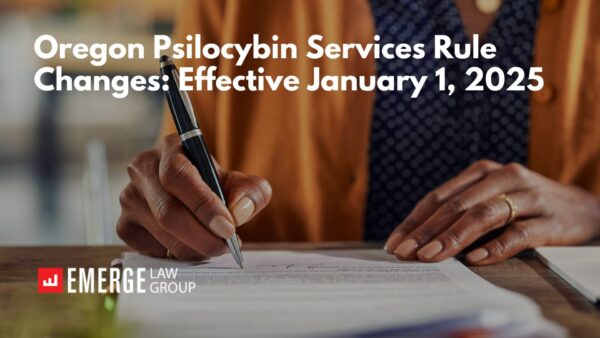CannaBeat is a curated biweekly selection of top news stories impacting business, research, and culture in the cannabis industry, crafted by Emerge Law Group.
Emerge’s Hot Take
States Act to Deny Licenses for Cannabis Companies with Debt Woes
California, Michigan, Nevada, New Jersey, New York, and Oregon are taking a closer look at who cannabis operators aren’t paying. Operators are failing to pay taxes, licensing fees, and vendor invoices. Some of these states are implementing new rules, while others are pursuing harsher enforcement.
California proposed legislation that would open an operator to disciplinary action for failure to pay vendors. California Senate Bill SB 766, states that if the operator does not pay for goods or services valued at $5,000 or more within 15 days after the due date, the creditor can report the operator and the department will subsequently send a 30-day notice to pay. If the operator doesn’t pay within that time, the department will pursue disciplinary actions – including denial of licensure. Emerge Law Group’s California Attorney Delia Rojas says that “non-payment of invoices for products and services has become a huge issue in California. Many businesses have to make tough decisions, choosing who to pay. Most operators are doing everything they can to stay afloat and non-payment to their trusted vendors is not their first choice.” Cannabis is heavily taxed, and operators are regulated more than almost any other industry. Not only is the cost of compliance high, but the constant change of regulatory requirements adds additional costs for operators.
Oregon also recently passed related legislation expanding the authority of the Oregon Liquor and Cannabis Commission to deny or withhold a license to operators who fail to provide proof of tax compliance. This goes into effect today, June 16, 2023. Emerge Law Group’s Oregon s discusses the new law in detail here.
In New Jersey, the Cannabis Regulatory Commission recently revoked two licenses from an operator due to unpaid license fees. The operator was completely surprised by this decision as they had worked out an agreement with the CRC to pay the licensing fees, and yet, the CRC still voted 5-0 to revoke their cultivation and manufacturing licenses. Emerge East practice leader and Shareholder Duncan Delano had this to say: “Looks like another episode in the ongoing battle between New Jersey regulators and multistate operators (MSOs).”
Enforcement for payment is increasingly becoming a focus for regulators. Stakeholders are divided on whether any of these approaches will help. Many wonder how someone can pay creditors if they lost their license to operate.
Other Noteworthy News
The Cannabis Industry is Growing, and Worker Protections Must Grow With It (op-ed)
"As states across the country legalize cannabis, Americans are confronted with the rare and remarkable opportunity to shape an industry that is still in its infancy. A few weeks ago, [Ademola Oyefeso] had the privilege of testifying before the Senate to advocate for the thousands of cannabis workers that the United Food and Commercial Workers International Union (UFCW) represents across the country. In [the] testimony, [Oyedepo] outlined the financial instability and literal danger that cannabis workers across the country face, issues that our elected leaders can and should fix as we shape the landscape for this new and emerging industry. Two decades ago, when the UFCW first began advocating for cannabis workers, testifying about legal cannabis before the Senate was not something many people imagined we could do. Thankfully, years of laying down the groundwork has brought us here."
Nevada Law Makers Pass Marijuana Reform Bills
"Nevada lawmakers last week passed an omnibus marijuana reforms bill that increases the possession limit on cannabis and gives licensed dispensaries new flexibility to serve both medical marijuana patients and adult-use cannabis customers. The measure, Senate Bill 277, received final approval from the Nevada legislature on June 5 and now awaits action from Republican Gov. Joe Lombardo. The legislation makes several substantial changes to Nevada’s laws governing marijuana, which was legalized for medical use in the state in 2001. In 2016, voters passed Question 2, a ballot measure that legalized recreational marijuana in Nevada for adults 21 and older. Senate Bill 277 more than doubles the possession and purchase limits for marijuana, increasing the cap from one ounce of cannabis to 2.5 ounces. The legislation also doubles the limits for cannabis concentrates from one-eighth of an ounce to a quarter ounce. Possession and purchase limits are commonly included in state laws to legalize cannabis in an effort to prevent regulated cannabis from being resold on the illicit market. But Democratic state Sen. Dallas Harris, the primary sponsor of the legislation, noted in a recent meeting of the Senate Commerce and Labor Committee that such provisions unfairly target cannabis."
Minnesota Begins Process of Clearing Cannabis Convictions as Promised by Legalization Law
"Some Minnesotans will soon be able to have certain criminal records expunged thanks to the Adult-Use Cannabis Law and the Clean Slate Act. Both laws require the automatic expungement of some records in the Bureau of Criminal Apprehension's (BCA) Criminal History System (CHS). The Clean Slate Act goes into effect Jan. 1, 2025. Criminal history records will soon contain a notice that cannabis-related offenses may be eligible for expungement under the Adult-Use Cannabis Act, which goes into effect on August 1. In the lead-up to Minnesota's May 2023 official legalization of adult-use cannabis, Sen. Clare Oumou Verbeten of St. Paul called legalizing cannabis a "racial justice issue" for people who have marijuana-related convictions on their records. Expunging those Minnesotans' convictions, she said, would make a "world of difference" for them. "People should know that these convictions have a long, lingering effect on people's lives. This is what this bill is about. It's about righting those past wrongs." An estimated 66,000 cannabis-related records are eligible for automatic expungement as well as an additional 230,000 records that will be eligible for review by the Expungement Review Board at the Minnesota Department of Corrections. Offenses will remain on an individual's record until the BCA implements technical and programmatic changes in the CHS, which will likely occur closer to August 2024..."
Subscribe
Subscribe to CannaBeat to receive essential weekly articles on news, business, and culture in the cannabis industry, delivered straight to your inbox.
CannaBeat by Emerge Law Group
CannaBeat is a weekly brief on news, business, and culture in the cannabis industry curated by members of Emerge Law Group's distinguished Cannabis Industry Group.






